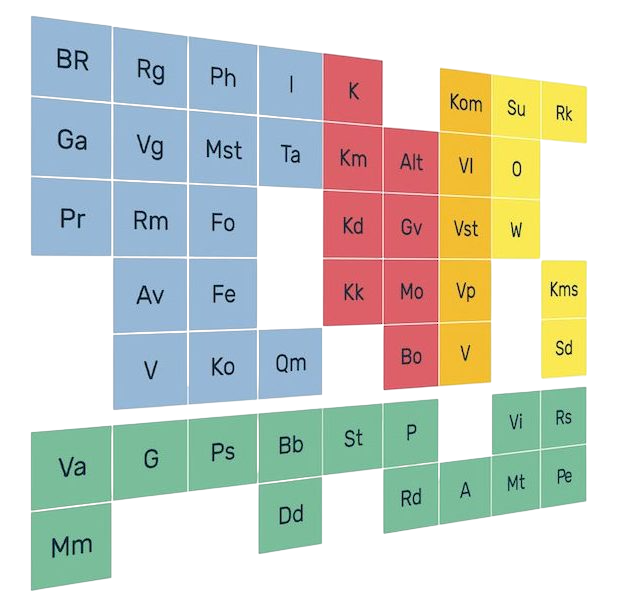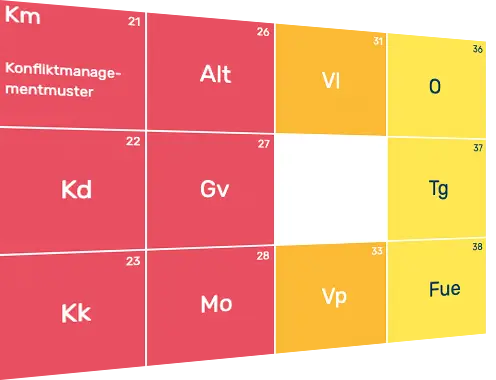Mediation training
Information video on the training programme
Hier gibt es erste Eindrücke unserer Ausbildung in den historischen Räumlichkeiten der Alten Baumwollspinnerei in Leipzig, inkl. Erläuterungen durch Teilnehmer*innen eines Kurses.
Ziele der Ausbildung in Mediation
We set priorities – right from the start.
Here you will find the dates for the mediation training courses.
From February 2026
- Module 1: 26-28 February 2026
- Module 2: 16-18 April 2026
- Module 3: (06 May, 9-14 online) 07 – 09 May 2026
- Module 4: (03 June, 9-14 online), 04 – 06 June 2026
- Module 5: (24 June, 9 am - 2 pm online), 25 – 27 June 2026
From October 2026
- Module 1: 08-10 October 2026
- Module 2: 12-14 November 2026
- Module 3: (09 December, 9-14 online) 10 – 12 December 2026
- Module 4: (20 January, 9-14 online), 21 – 23 January 2027
- Module 5: (17 February, 9 am - 2 pm online), 18 - 20 February 2027
From March 2027
- Module 1: 04-06 March 2027
- Module 2: 08-10 April 2027
- Module 3: (02 May, 9 am - 2 pm online) 03 April - 01 May 2027
- Module 4: (02. Juni, 9-14 Uhr online), 03. – 05. Juni 2027
- Module 5: (30 June, 9 am - 2 pm online), 01 - 03 July 2027
Mediation
- Mediation als Konfliktberatungsansatz, Verfahren und Methode zugleich.
- Prinzipien der Mediation – und ihre Paradoxien, Widersprüchlichkeiten und Mehrdeutigkeiten
- Voluntariness and confidentiality issues
- Haltung, Rolle und Aufgaben des Mediators – Was ist mein Vermittlungsverständnis?
- Fields of application and forms of mediation
- Contractual foundations of mediation
- Mediationsphasen im Kontext von Organisationen, insbes.
- Kontakt- und Kontraktphase
- Kontaktaufnahmen von Interessenten
- From the enquiry to the triangle
- from transactional analysis: Grundhaltungen, Rollen- und Weltmodelle
Practical exercises, role plays, case work
Konflikt und Konfliktmanagement
- Conflict understanding and perspectives
- Conflict dynamics
- Dritte im Konflikt (Vermittler, Schlichter, Richter)
- Consultancy approaches: Specialist and process consulting
- Kontrakt- und Klärungsphase
- Darstellung der Problembereiche und Konfliktperspektiven
- Erhellung der Konfliktdynamiken (=Eskalation der einseitigen Lösungsversuche)
- from transactional analysis: Drama-Dreieck, Game-Pentagon
Practical exercises, role plays, case work
Law
- Law and mediation
- Recht als Leitseil und als begrenzte Spielwiese
- Mediation law
- Law in mediation
- Mediation Act
- Mediation clauses
- Law in mediation (law as a framework condition, professional rights)
- Klärungsphase: Konflikterhellung
- from transactional analysis: Stroke-Konzept, Ersatzgefühle, Beziehungsbedürfnisse
- Visualisation in mediation
Practical exercises, role plays, case work
Interventions
- Interventions in mediation
- Die Macht des Paraphrasierens und Zusammenfassens
- zirkuläre, strategische und reflexive Fragestellungen
- Negotiation theory
- Negotiation blockades and traps
- Fourth parties in mediation (experts and lawyers)
- Creativity techniques
- Creativity phase
- Lösungsoptionen entwickeln
- Kreativitätstechniken und -methoden
- from transactional analysis: Grundhaltungen, Passivitätskonzept, Redefinitionen
Practical exercises, role plays, case work
Closing agreement
- Law of the closing agreement
- Rechtsdienstleistungsgesetz: Mediatoren zweiter Klasse?!
- Vollstreckbarmachung der Abschlussvereinbarung
- persönliche Standortbestimmung
- Marketing for mediation services
- Kreationsphase: Abschlussvereinbarung und Umsetzung
- from transactional analysis: drivers, transactions in the narrow sense, psychological games

Unser Lernmanagementsystem ELEMENTE DER MEDIATION
Didactic training concept
- They are trained on the basis of our didactically well thought-out and digitally unique training and further education concept.
- Right from the start, we train you to think about the organisation's perspective and act accordingly.
- You benefit from our extensive and high-quality practical experience in complex organisational contexts.
- Sie erhalten unsere legendären Karteikarten ausgehändigt sowie digital (www.elemente-der-mediation.de).
- As far as possible, you can also carry out case supervision within the meaning of the Mediation Act – in the presence of the group – as part of the training course. There are no additional costs for this.
Hausinterne KI-Untersützung
Wir experimentieren nicht nur frei zugänglich mit unseren Künstlichen Intelligenzen (siehe KI-Kompass), sondern stellen exklusiv für unsere Ausbildungskandidat*innen spezifisch konfigurierte Künstliche Intelligenzen zur Verfügung. Sie können mit diesen KI-Tools mediationstypische Konversationsübungen carry out.
- Auftragsklärungsgespräche für Organisationsmediationen
- Einzelgespräche als Vorbereitung für die Vermittlungsgespräche
- Fragetechniken einüben

Your trainer Prof Dr Sascha Weigel
Prof Dr Sascha Weigel, Mediator and Trainer (BM), Senior Coach (DBVC), Teaching Transactional Analyst under Supervision PTSTA-O (EATA/DGTA); Honorary Professor for Mediation and Conflict Management MLU Halle

Co-trainer Angelika Wendt
Angelika Wendt, mediator and systemic consultant, organisational consultant, adult educator

Stimmen der TeilnehmerInnen
Informationen und Konditionen zur Grundausbildung in Mediation
Comments on our work
After an initial mistake at another training institute, I was impressed by you from the very beginning. totally enthusiastic ...you have created a great education...and with an ideal group, personalities from different industries, age groups, professions...in short: a perfect learning environment. I am a real fan and would recommend the training programme to others at any time.
The training you offer with INKOVEMA is very demanding, very appealing and rhetorically so pleasant and so well-founded in terms of content
The decisive factor with INKOVEMA is the combination of a solid legal background, a dialogue-based approach and the explanatory content of transactional analysis models. This combination makes mediation a powerful instrument.
Of course, you can go elsewhere and do seminars and training courses there, but why? Here the quality is right, the content and presentation are at the highest level. Simply great.
For me it was a Top-class training. Sascha always teaches in a practical manner, sharing the experience gained from his many years as a mediator and embedding the content in the dynamics of society and organisations. All this with a lot of humour and sensitivity.
Informationen und Konditionen zur Grundausbildung in Mediation

Elements of mediation
Die Elemente bieten ein System, das die Bandbreite der Theorie und Praxis von Mediation verdeutlicht.
In ihrer strukturierten Form vermögen sie die Theorie aufzufalten, um den eigenen Lernprozess sinnvoll zu gestalten. Dabei reduzieren die fünf Hauptgruppen die Komplexität der Anforderungen mediativer und beraterischer Praxis





